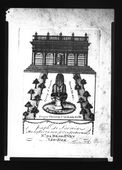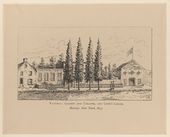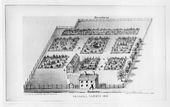Difference between revisions of "Vauxhall Garden"
[http://www.nga.gov/content/ngaweb/research/casva/research-projects.html A Project of the National Gallery of Art, Center for Advanced Study in the Visual Arts ]
M-westerby (talk | contribs) |
M-westerby (talk | contribs) |
||
| Line 1: | Line 1: | ||
==Overview== | ==Overview== | ||
| − | |||
| − | |||
| − | |||
'''Location:''' New York, NY<br> | '''Location:''' New York, NY<br> | ||
'''Condition:''' demolished<br> | '''Condition:''' demolished<br> | ||
| − | |||
| − | |||
| − | |||
| − | |||
<hr> | <hr> | ||
Revision as of 14:10, September 1, 2021
Overview
Location: New York, NY
Condition: demolished
Texts
- Anonymous, January 28, 1771|January 28, 1771, describing Vauxhall Garden, New York, NY (New York Gazette, and Weekly Mercury)
- “To be sold at private Sale, the commodious house and large gardens, in the out ward of this city, known by the name of VAUXHALL; the situation extremely pleasant, having a very extensive view both up and down the North River. . . there are 36 lots and a half of ground laid out to great advantage in a pleasure, and kitchen garden, well stock’d with fruit and other trees, vegetables, &c. and several summer houses which occasionally may be removed; the whole in extreme good order and repair, well fenced in, very fit for a large family, or to entertain the gentry, &c. as a public garden, &c. The premises are on lease from Trinity Church, sixty one years of which are yet to come.”
- Anonymous, July 6, 1799|July 6, 1799, describing Vauxhall Garden in Spectator, New York, NY (quoted in Eberlein and Hubbard 1944: 171)[1]
- “At 5 o’clock in the evening, the sixteen colours of each Summer-house were carried, at the sound of the music, to the Grand Temple of Independence, which is 20 feet diameter, and 20 feet high. . . in the middle of which was presented, the Bust of the great Washington as large as life, and near him a Grand Gold Column, representing the Constitution, and below the said Column the Figure of Fame, 6 feet high, presenting to him with one hand a Crown of Laurel, and with the other holding a Trumpet, announcing to the public that she crowns Real Merit.”
- Anonymous, July 2, 1804, describing Vauxhall Garden, New York, NY (New York Daily Advertiser)
- “At 8 o’clock will commence the most complete illumination, consisting of upwards of four thousand Colored Lamps, and decorated. . . with Pyramids, Obelisks, Arches, &c.”
- Anonymous, June 25, 1805, describing in the New York Daily Advertiser Vauxhall Garden, New York, NY (quoted in Eberlein and Hubbard 1944: 172)[2]
- “The labour and expence of this establishment has exceeded that of any similar one in the United States. . . [that] he has at a very considerable risk and expence, procured from Europe a choice selection of Statues and Busts, mostly from the first models of Antiquity. . . the walks are ornamented with Pillars, Arches, Pedestals, Figures, &c. the whole of which when illuminated, cannot fail to create pleasure.”
- Lambert, John, 1816, describing Vauxhall Garden, New York, NY (1816: 2:61)[3]
- “New York has its Vauxhall and Ranelah; but they are poor imitations of those near London. They are, however, pleasant places of recreation for the inhabitants. The Vauxhall garden is situated in the Bowery Road about two miles from the City Hall. It is a neat plantation, with gravel walks adorned with shrubs, trees, busts, and statues.”
- Mathews, Cornelius, 1842, describing Vauxhall Garden, New York, NY (quoted in Garrett 1978: 391)[4]
- “Puffer entering, was overwhelmed with the gorgeousness and splendor of the spectacle that broke upon him. In the first place, the Garden, to which he was a stranger, was filled with trees— which was a novelty in a New-York public garden—some short and bushy, others tall and trim, but actual trees; then there were a thousand eyes or better lurking and glaring out in every direction, in the shape of blue and yellow and red and white lamps, fixed among the trees and against the stalls; then there was a fountain; and then, through two rows of poplars, commanding a noble prospective of two white chimney-tops in the rear, there stretched a floor—the ball-room floor itself.”
Images
Peter Maverick, Trade Card depicting Joseph de Lacroix's Ice House, c. 1796. The Ice-House Garden existed at 112 Broadway.
Notes
- ↑ Harold Donaldson Eberlein and Cortlandt Van Dyke Hubbard, “The American ‘Vauxhall’ of the Federal Era Article Stable,” Pennsylvania Magazine of History and Biography 68 (1944): 150–74, view on Zotero.
- ↑ Harold Eberlein and Hubbard 1944, view on Zotero.
- ↑ John Lambert, Travels through Canada, and the United States of North America in the Years 1806, 1807, and 1808, 2 vols. (London: Baldwin, Cradock, and Joy, 1816), 61, view on Zotero.
- ↑ Thomas Myers Garrett. “A History of Pleasure Gardens in New York City, 1700–1865” (PhD diss, New York University, 1978), view on Zotero.




